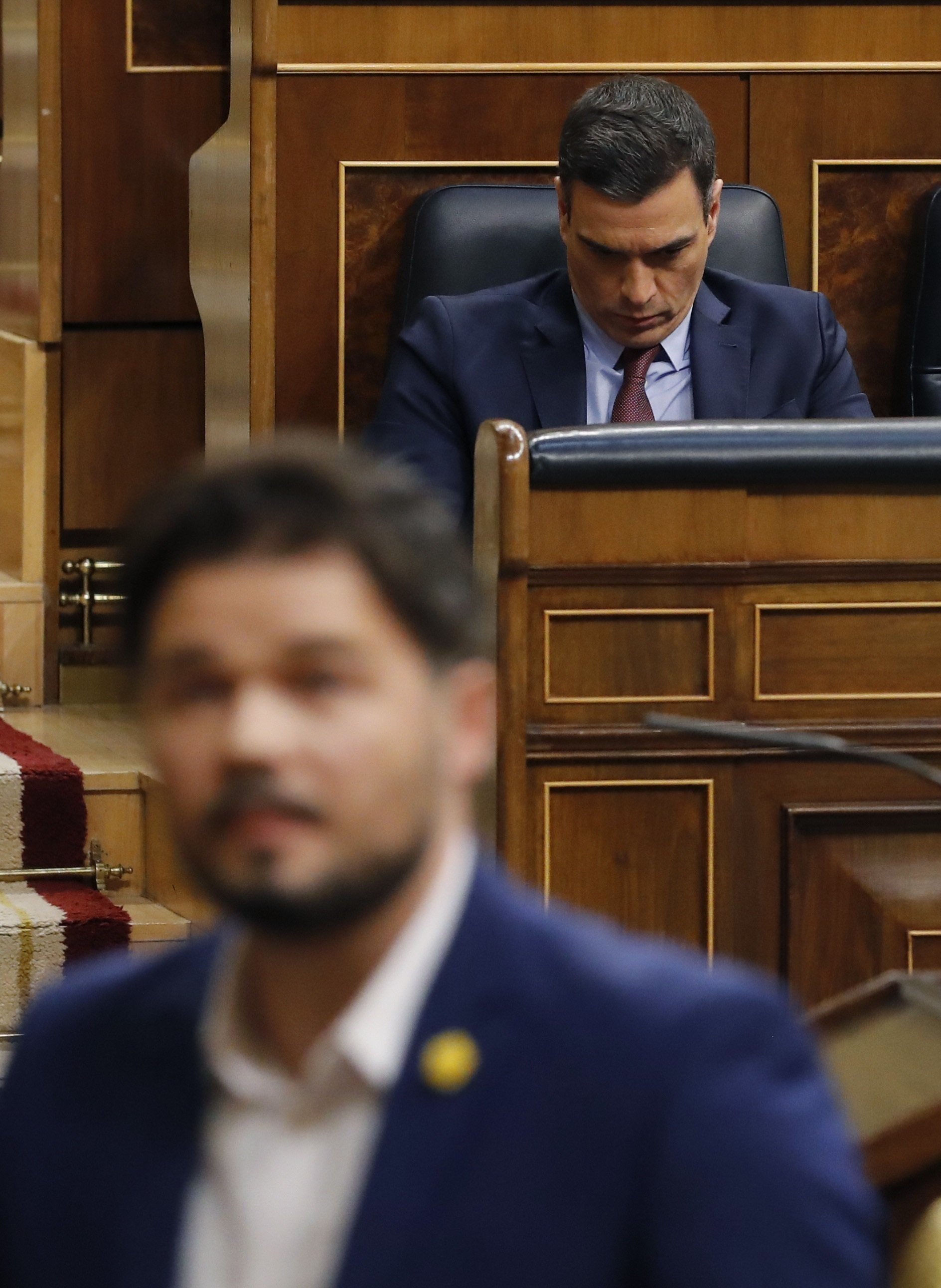This Wednesday's session in the Spanish Congress has probably been the most revealing of all those held during the coronavirus crisis. Today, Pedro Sánchez managed to save the furniture and win his fourth extension of his method for fighting the coronavirus crisis, the state of alarm. The Spanish prime minister got the vote through at the last minute, by the skin of his teeth and losing some of his most loyal allies along the way - specifically, the Catalan Republican Left (ERC), the last pro-independence party he had on his side. This gap had to be filled by the ten seats of Ciudadanos (Cs), giving Inés Arrimadas prominence on her third official day at the helm of the party. The final tally: 91 fewer votes in favour than two weeks ago. Spain's state of alarm, guaranteeing centralized control of the crisis, will continue until May 24th at least.
If two weeks ago there were 269 si votes, this Wednesday the number of MPs in favour fell to 178, scarcely more than half the chamber. Sánchez's PSOE, Podemos, Ciudadanos, the Basques Nationalists of the PNV and other small parties voted with him. On the other side, the votes against totalled 75, those of the far right Vox and this time, those of all three Catalan pro-independence parties, ERC, JxCat and the CUP. There were 97 abstentions, including 89 from the main opposition group the Popular Party (PP), which in the end do not go all the way to a no, and those of Basque independence group EH Bildu, which did not want to block the motion.
The fourth extension was assured just before the session began. Last night, the Sánchez government announced an accord with Cs, under which they will hold weekly meetings with the government, and the executive has agreed to study how to extend the current economic and social measures beyond the state of alarm, which will last for as long as "strictly necessary". This morning, before Congress sat, the PM assured the votes of the PNV, which will see its amendment passed reinforcing "co-governance" mechanisms between the central state and the autonomous communities during the deconfinement process.
In this context, Pedro Sánchez had to face another day of fierce criticism in parliament: from the right, the far right (which threatened him with a no-confidence motion), and some of his own allies and partners, such as the Catalan pro-independence groups, who all ended up voting against him. It was symptomatic that Joan Baldoví of the Valencian left-wing group Compromís, suggested the prime minister should go and "sit in the corner" to reflect on his actions, despite voting for the new extension. The main source of conflict: the retention of the state's single command.
Sánchez, in defence of his single command
With little success, Sanchez tried to calm the storm of complaints at his excessive centralism. He began his speech promising that Spain's autonomous communities will play a “leading role” in the lifting of lockdown. They would be able to propose territorial units - alternatives to the organization by provinces which his executive had proposed - as well as additional measures in the plan "with due justification". They will even “have interpretive capacity” for the measures, given the complexity, and the final decision will “preferably" be consensual. But the last word will be with the Spanish ministry of health.
Later, in his time for reply, while still denying the recentralization of powers, he was forced to defend the single command after it had been so heavily criticized. Sanchez recalled that Catalan president Torra had asked him at the beginning of the crisis to limit mobility between provinces. And the PM used this argument to defend the state of alarm: “The Catalan government does not have legal instruments to close Barcelona. It doesn't have them ”. This, he argued, could only be done by the Spanish government with the state of alarm. He also poured scorn on the suggestion of deconfinement by health areas in Catalonia: "People don't know the boundaries of a health area. Do you know them, Mr Rufián?"
Break with independence parties
In this fourth extension of the executive's special powers, Sánchez lost the support of the remaining Catalan independence MPs, as even ERC voted against him. ERC's Gabriel Rufián showed his anger at a government which had proclaimed its willingness to dialogue, repeating a phrase he had used in the first days of the government: "Without dialogue there is no legislature".
Laura Borràs of JxCat criticized the Spanish prime minister for the agreement reached with Ciuadadanos. "We were told that there was no plan B and they ended up approving a plan C, from Ciudadanos," the party's spokeswoman joked, while the CUP's Mireia Vehí also denounced that the Spanish government wanted to create a "state of siege" to curtail freedoms.
The main opposition party, the PP, finally opted to abstain in the vote, but leader Pablo Casado gave a warning: “If you don't find a plan B in 15 days, don't bother asking the opposition for loyalty and unity again”. He referred to the "moral lowliness" of the Spanish government. Meanwhile, far right Vox threatened to employ all mechanisms at its disposal to fight what it called the "social communist" government. Party leader Santiago Abascal threatened Pedro Sánchez with the presentation of a no confidence motion. Vox, third largest party in the house with 52 MPs, has the minimum numbers required (10% of the 350-seat house) to propose it.

